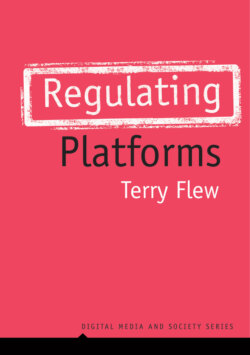Читать книгу Regulating Platforms - Terry Flew - Страница 17
The New Economy
ОглавлениеThe dominance of free market and pro-competition principles of this kind, in communications policy and in public policy more generally, for two decades from 1990 on, has commonly been described as a dominance of neoliberalism. Neoliberalism is seen as ‘a theory of political economic practices that proposes that human well-being can best be advanced by liberating individual entrepreneurial freedoms and skills within an institutional framework characterized by strong property rights, free markets and free trade’ (Harvey, 2005, p. 2) – a theory according to which ‘the production of efficient markets should be the primary goal of public policy’ (Hesmondhalgh, 2019, p. 51). The neoliberal agenda has been described by the International Monetary Fund (IMF) as being built around two key principles: ‘increased competition – achieved through deregulation and the opening up of domestic markets … to foreign competition’, and ‘a smaller role for the state, achieved through privatization and limits on the ability of governments to run fiscal deficits and accumulate debt’ (Ostry et al., 2016, p. 38). Neoliberalism has been characteristically linked to the dominance of neoclassical economics in the fields of media and culture, given their focus upon rational choices made through markets by profit-maximizing firms and by individual consumers who seek to maximize personal satisfaction (Freedman, 2008; Hesmondhalgh et al., 2015; Hesmondhalgh, 2019).
I have argued elsewhere that the concept of neoliberalism lacks analytical precision and risks becoming an omnibus category for any aspect of contemporary capitalism that a particular theorist finds objectionable (Flew, 2012). My point here is somewhat different: insofar as neoliberalism has relevance as a particular and more delimited historical, institutional, and policy project, its conceptual agenda should be seen as distinct from that of neoclassical economics (Flew, 2015b). The focus on‘creative destruction, derived from Schumpeter, was different from the one encountered in mainstream media and cultural economics. Instead of seeking market equilibrium, this evolutionary economics (Cunningham et al., 2015; Potts, 2011) pointed to the ways in which digital technologies and the ICT companies that expanded into new fields disrupted established industries and markets, and in so doing cancelled the split between old media and new media from media organizations (Mierzejewska, 2018).
